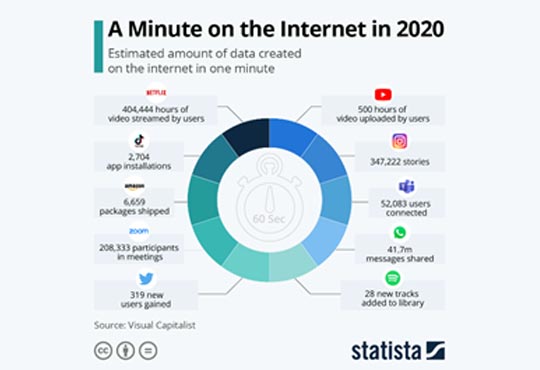7 Easy Ways To Preserve Privacy In The Internet Age
CIOReviewIndia Team | Tuesday, 09 March 2021, 13:23 IST

The ‘I’ in IT no longer stands for Information. It is now the literal ‘I’ – which means ME, my persona, my preferences, my user experience, my digital presence, my privacy and more.
Every action we take online - be it a facebook like, a song download or a bill payment - generates data about our preferences. Data about how we search, where we look, what we watch/buy, and where we go.

This vast data lake has birthed a new market, thanks to the data generated by our clicks, searches and actions. This digital footprint is then being used for personalized offers, target marketing and enticing us to spend more. Often it is morphed as “Customer Intimacy – knowing your customer well”.
And, that’s the reason why there is such a hue and cry about the update/change in WhatsApp's privacy policy. In the new framework, the privacy of our messages and calls is still protected because WhatsApp communications are encrypted. But, other personal data - like our phone numbers, location, how often we use the app, even the screen resolution on our devices - is not protected. This data has been and will be shared with Facebook (the parent company).
So, how does this play out in our daily lives? Well, Facebook might note your likes and serve up an ad on Instagram that reflects your opinions/feelings. Instagram will let you click on a link to send the seller a WhatsApp message. The seller can respond with their offer and you can buy from them instantly using WA’s UPI payments feature. This effectively means you can complete an entire transaction without leaving Facebook’s system. The details of your transaction can then be stored by the seller using Facebook infrastructure. Since both the seller and Facebook have access to this data, you can look forward to receiving targeted offers in the future, not just from this one seller but also other sellers. Convenient or scary?
Data privacy - fact or fiction?
For many years Bigtech (Google, Facebook, Amazon etc) has been all pervasive (read intrusive) - peaking at and monetizing our data. Be it the web browsers and search engines we use or our smartphones and connected devices; everything has the potential ability to encroach on our privacy.
Last month, Apple introduced the App Tracking Transparency feature. It gives users the option to conceal a device identifier that is needed for serving and measuring ads. This gives back users some control and disadvantages companies like Google and Facebook that personalize ads based on your activity online.
Interestingly, WhatsApp’s updated data sharing guidelines don’t apply to the European Union, chiefly due to the General Data Protection Regulations (GDPR). India’s Personal Data Protection (PDP) legislation - modeled on GDPR - is also designed to give us more power to make companies collect less data. But until that happens, what steps can we take to preserve our privacy online?
7 everyday steps to protect privacy
- First things first. Secure your accounts, devices, and back-ups using strong passwords, multi factor authentication, encryption etc. This may not protect you from trackers and cookies, but it is definitely good security hygiene.
- Change your browser. Popular browsers like Chrome, Mozilla, etc. use cookies to track your activity and target advertising. Tor offers unbeatable privacy. If you continue using popular browsers, then switch to incognito mode. While not completely private (as your ISP can still see your activity), it is more private than open browsing.
- Turn off ad personalization on social sites and in browsers.
- Use a different search engine like Duckduckgo that offers private searching and tracker blocking to keep you safe online.
- Use a Virtual Private Network (VPN) to mask your IP address and access the internet anonymously. This ensures that no one can track you and gather intelligence on your activities.
- Refrain from sharing personal information on social media. It can be thrilling to have friends and colleagues from all over the world wish you Happy Birthday on Facebook or LinkedIn. But, it’s also the first place that identity thieves search for such information.
- Use secure, end-to-end encrypted apps on your phone. Delete unnecessary and untrustworthy apps to keep your device and data safe. Apps can access an immense amount of data and learn a lot about you. You never know which harmless-looking app is selling the data it gathers.
Conclusion
Saurabh Singh is a sales veteran with over two decades of IT Services selling experience in India and America. He is currently leading the charter across all business verticals to -grow, manage & transform -the business for CMSIT Services as a Director and Region Head, North. Prior to joining CMS IT, he spent a considerable amount of time at Wipro managing multiple roles spanning multiple geographies, cutting across various business verticals including Product Sales, Software services Sales, IT Outsourcing services & more.




